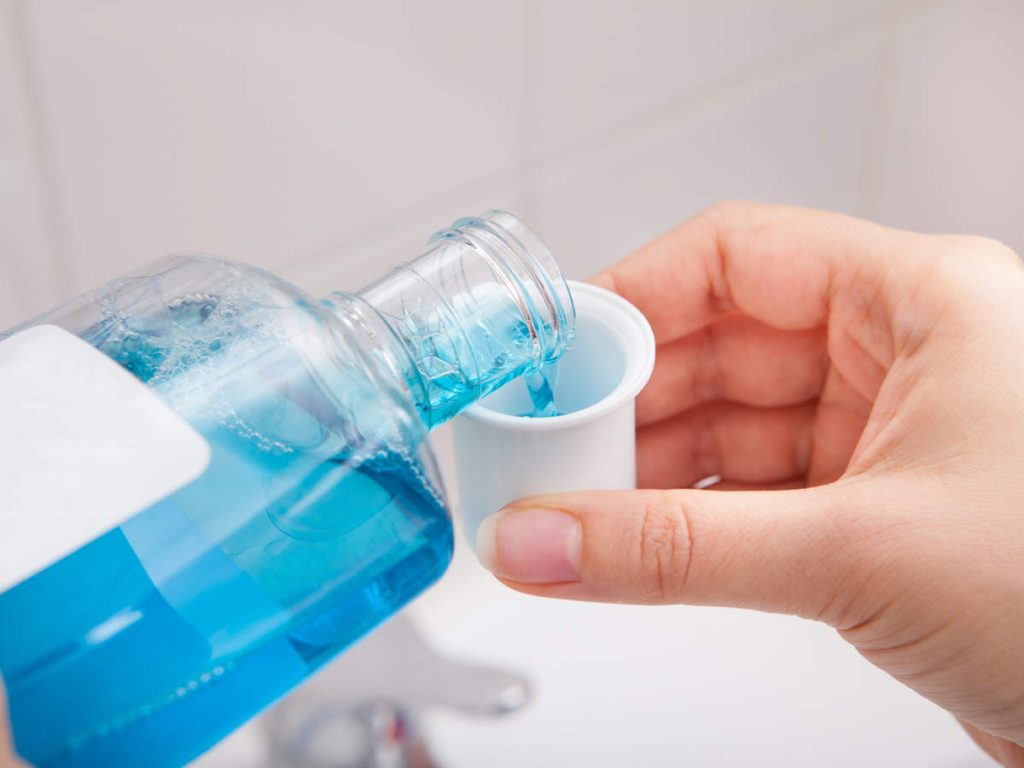Mouthwash is marketed as a way to battle bad breath head on, but how well does it really work? The answer lies in its battle strategy. Most people who use mouthwash report a cleaner, fresher mouth — at least until the next match. Mouthwash can tag team with brushing and flossing — but mouthwash alone will not win the fight against bad breath.
Check Out the Competition
Bad breath comes from the mouth bacteria that cause dental plaque and release volatile sulfur compounds, which create a foul-smelling odor. Most mouthwashes are developed to either reduce the amount of bacteria or neutralize the compounds themselves, temporarily covering the odor until they build back up again.
Since we all have bacteria in our mouths, we’re all susceptible to a little musty breath at times — and mouthwash offers a quick fix for the problem. But for those who suffer from chronic bad breath, or halitosis, mouthwash probably won’t help. Halitosis is often the result of another problem like tooth decay, gum disease, dry mouth, sinus or stomach conditions, as well as medical or dental problems that affect the mouth.
If you think you might have halitosis, you’re not alone: An estimated 25 percent of Americans have chronic bad breath. What many people don’t realize is that they have a cure right under their noses — a dentist can diagnose and treat bad breath and help you keep it from returning in the future.
In This Corner …
When bad breath makes an occasional appearance, you have a few options to treat it. There are two types of mouthwash for you to consider as part of your oral hygiene routine:
Cosmetic — Cosmetic mouthwash is used to freshen breath. Although over-the-counter mouthwash masks bad breath, it doesn’t cure halitosis and its effect only lasts up to three hours. But anti-bacterial mouthwashes do reduce bacteria and remove debris before or after brushing, which can give an extra boost to your oral hygiene routine.
Therapeutic — These mouth rinses help control the oral problems that cause bad breath. Therapeutic mouthwashes may be recommended to reduce dental plaque, control gingivitis (keep in mind that mouthwash is not a gum disease treatment and periodontal disease can only be treated by a dentist) and provide relief from oral pain; fluoride rinses help strengthen teeth and prevent tooth decay. Some therapeutic mouthwashes can only be prescribed by a dentist and may be used to help keep the mouth clean after oral surgery.
Step Into the Ring
Your mouthwash should contain directions for usage. Follow the directions and use only the proper amount indicated on the label to reduce the possibility of side effects. Most mouthwashes should be swished around the oral cavity for 30 seconds and spit out. Avoid swallowing mouthwash, as the ingredients can upset your stomach. After rinsing, you should not eat or drink anything for at least 30 minutes, as to not diminish its effectiveness. For lasting results, don’t smoke — smoking not only causes bad breath but also ruins the effectiveness of mouthwash.
Be On the Look Out
Some mouthwashes contain a high level of alcohol, which has no therapeutic value. Surprisingly, alcohol doesn’t kill germs but is used as a preservative to sustain the mouthwash’s active ingredients. Unfortunately, alcohol-containing mouth rinses can cause a burning sensation for some patients. Mouthwash is also not recommended for children under the age of 12 as it poses a risk of alcohol poisoning if swallowed.
Recently, there’s been much debate as to whether these mouth rinses cause more harm than good. Some say that alcohol-containing mouthwashes may end up causing the same problem they’re designed to fix. Alcohol is a drying agent — and if your mouth is dry, you can’t produce saliva. A dry mouth is a perfect environment for the bacteria that cause bad breath and tooth decay to grow. Saliva works like a natural mouthwash, helping wash away the elements that contribute to mouth odor. If you suffer from dry mouth, a mouthwash that contains alcohol may not be for you.
That isn’t to say you should avoid mouthwashes with alcohol. Different substances affect people in different ways, so a mouthwash with high alcohol content may not bother you. There is also no evidence that using an alcohol-containing mouthwash increases your risk of oral cancer — but you should read the label for other side effects, as some mouthwashes can cause tooth stains, ulcers and tooth sensitivity. Your dentist can help you decide which mouthwash is best for you.
Earn Your Title
Mouthwash can be beneficial for those who are prone to oral problems. Anti-bacterial mouth rinses can help those who are extremely susceptible to tooth decay or gingivitis, an early stage of gum disease. Mouthwashes may also be recommended for geriatric or disabled patients who might have dexterity problems or trouble managing dental products.
But for most of us, mouthwash is not meant to be a substitute for proper oral hygiene techniques. The best way to get rid of bacteria is through brushing and flossing, which you should be doing on a daily basis. Although mouthwash will reduce bacteria, it will not cure the oral problems that cause bad breath. If you want to “smack down” halitosis, visit your dentist regularly for dental treatment.
We’re all fans of fresh breath, and a good mouthwash can keep us from smelling offensive. If you’re interested in using mouthwash as part of your oral hygiene routine, speak with your dentist about which one is right for you.

